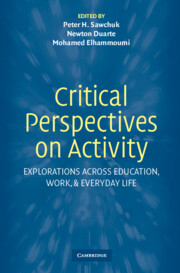Book contents
- Frontmatter
- Contents
- List of Contributors
- Foreword by Seth Chaiklin
- Acknowledgements
- 1 Introduction: Exploring Activity Across Education, Work, and Everyday Life
- SECTION I CRITICAL PERSPECTIVES ON THEORY
- 2 Is There a Marxist Psychology?
- 3 The Cultural–Historical Activity Theory: Some Aspects of Development
- 4 Epistemological Scepticism, Complacent Irony: Investigations Concerning the Neo-Pragmatism of Richard Rorty
- SECTION II EDUCATION
- SECTION III WORK
- SECTION IV EVERYDAY LIFE
- References
- Index
4 - Epistemological Scepticism, Complacent Irony: Investigations Concerning the Neo-Pragmatism of Richard Rorty
Published online by Cambridge University Press: 10 December 2009
- Frontmatter
- Contents
- List of Contributors
- Foreword by Seth Chaiklin
- Acknowledgements
- 1 Introduction: Exploring Activity Across Education, Work, and Everyday Life
- SECTION I CRITICAL PERSPECTIVES ON THEORY
- 2 Is There a Marxist Psychology?
- 3 The Cultural–Historical Activity Theory: Some Aspects of Development
- 4 Epistemological Scepticism, Complacent Irony: Investigations Concerning the Neo-Pragmatism of Richard Rorty
- SECTION II EDUCATION
- SECTION III WORK
- SECTION IV EVERYDAY LIFE
- References
- Index
Summary
INTRODUCTION
In recent years, researchers (Duarte, 2002a, 2003a; Moraes, 2001, 2003; Evangelista and Shiroma, 2003) have been trying to provide the objective means to understand the political and epistemological agenda that, in its cultural crusade to disqualify the school institution, have been proposing the formation and training of teachers with poor intellectual capacity, detached from the experience of thinking. Such a project is articulated with another, the one that limits the horizon of knowledge to sensitive experience. Research in education and in social sciences is therefore discredited, because it is regarded as a simple collection of empirical data, the development of tools to control those data in order to describe their probable future behaviour, an intervention strategy, or even, in its “post” versions, as a series of fragmented narratives, mere descriptions of the multiple aspects of everyday school life (Moraes and Muller, 2003). As Duarte (2003a: 1) put it, we are facing an agenda “that devalues school knowledge and an epistemology that devalues theoretical/scientific/academic knowledge.”
Researchers also denounce the epistemological scepticism (Bhaskar, 1989, 1991, 1986; Eagleton, 1991, 1999, 2003; Callinicos, 1989, 1991; Duarte, 2002a, 2003a; Moraes, 2001, 2003; Duayer, 2001, 2003) of the postmodern, poststructuralist, and neo-pragmatic currents with their different features and subtleties. Although they envisage signs of weakening in some of these trends, these researchers recognise the persistence of the epistemological scepticism, which along with a rising anti-realism and relativism, impoverishes the understanding of science and reduces the scope, strength, and depth of the gnosiological field.
- Type
- Chapter
- Information
- Critical Perspectives on ActivityExplorations Across Education, Work, and Everyday Life, pp. 52 - 72Publisher: Cambridge University PressPrint publication year: 2006



